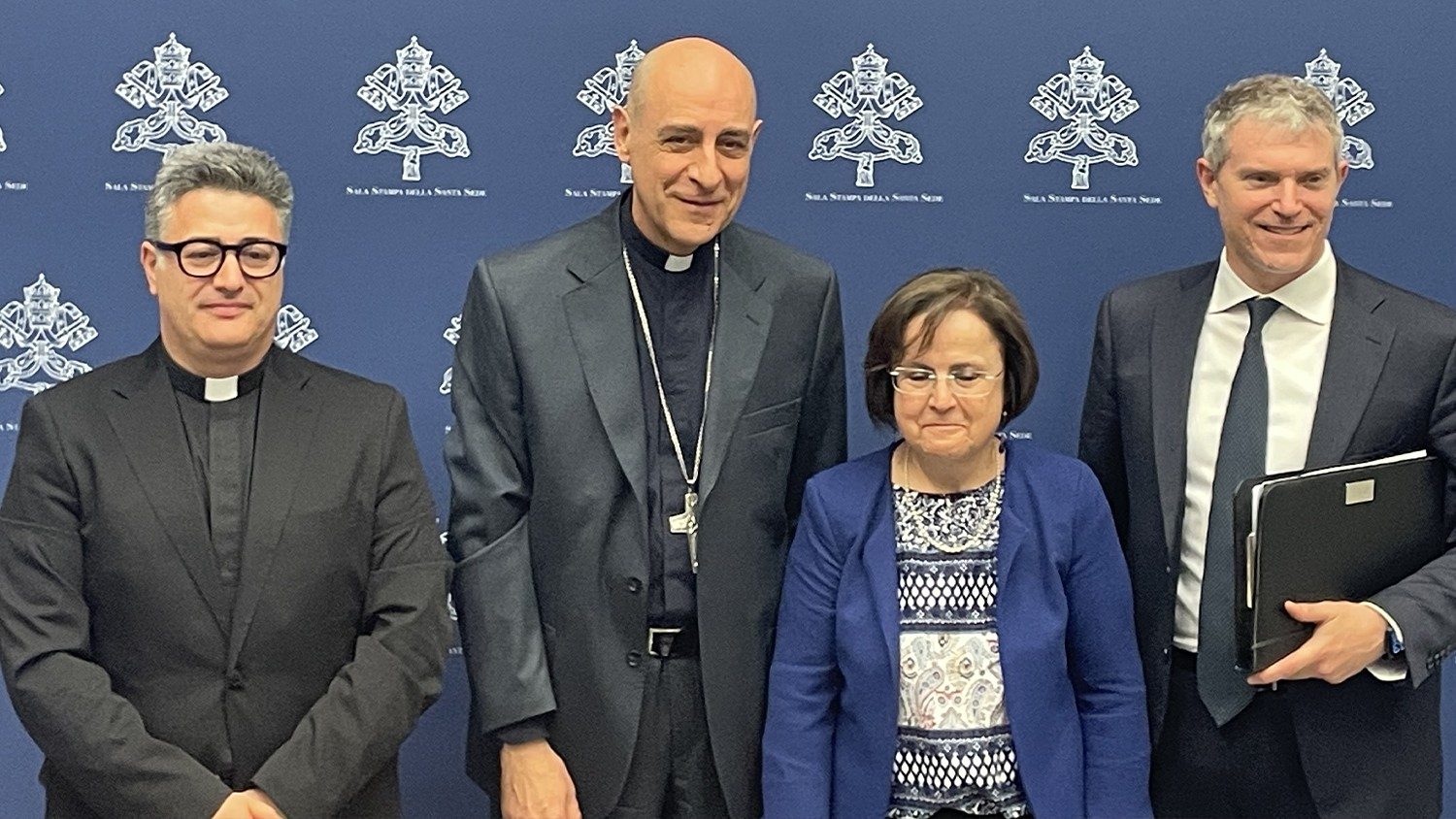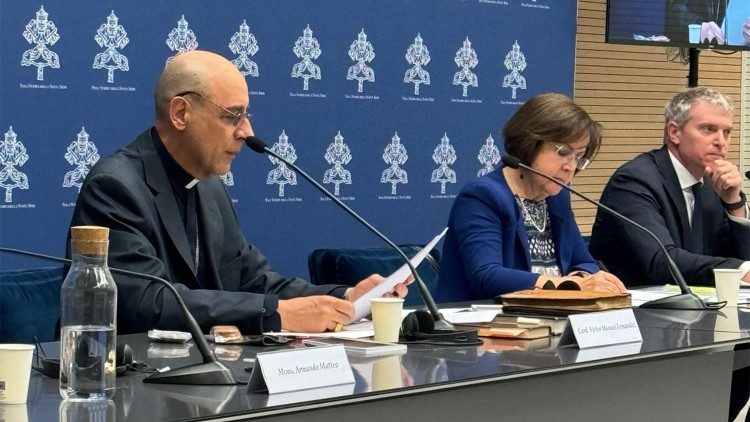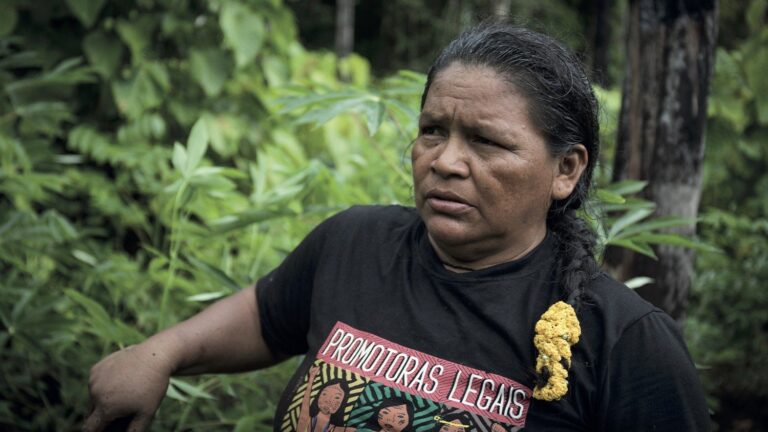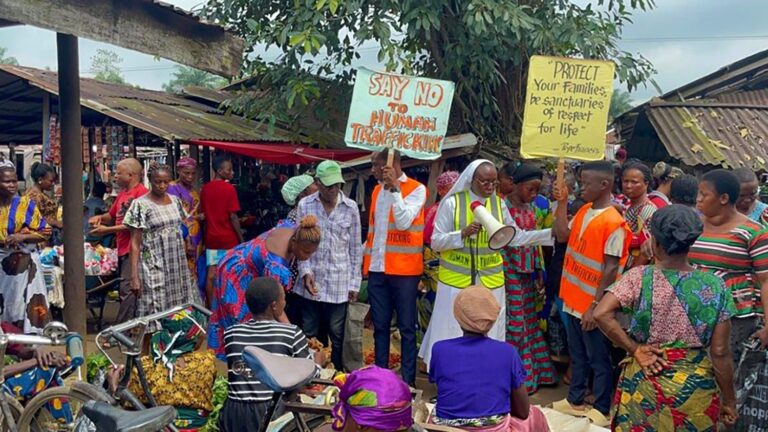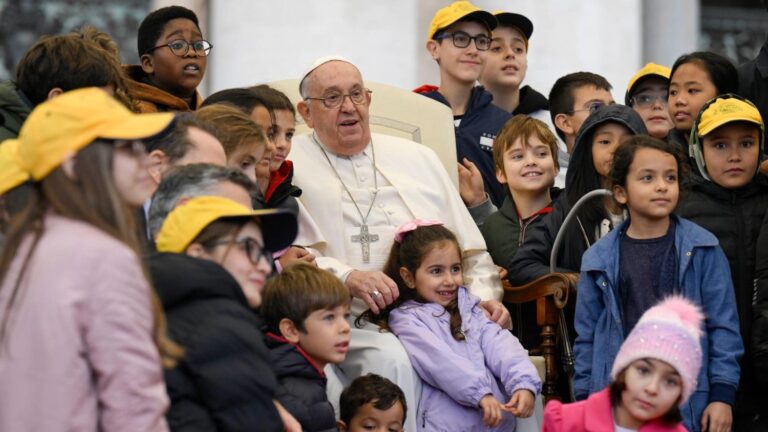Cardinal Fernández: Every single person has dignity
The Prefect of the Dicastery for the Doctrine of the Faith, Cardinal Víctor Manuel Fernández, presents the declaration of the Dicastery “Dignitas Infinita” which has just been published in the Press Office of the Holy See, calling it a “fundamental” document to recall that “everyone has their inalienable right”. dignity.”
By Salvatore Cernuzio
It was supposed to be called “Al di there di ogni circostanza» (“Beyond all circumstances”) to underline the fact that every man, woman, child – born in Italy or Ethiopia, in Israel or Gaza, inside or outside a border, in conflict or in peace – and in any culture or condition of life, has “the same immense, inalienable dignity” as no war, subordination or law contrary to human rights, such as the laws of certain countries which condemn the crime of homosexuality, cannot remove or diminish.
Instead, the title “Dignitas Infinita» was chosen for the document of the Congregation for the Doctrine of the Faith published today, April 8, after five years of work, to relaunch in a more direct way the always striking message of Christianity, namely that “God loves all. .. with infinite love.” In other words, these are the words that Pope Saint John Paul II spoke to a group of disabled people he met in Germany, during one of his countless Trips abroad.
Cardinal Víctor Manuel Fernández, prefect of the current Dicastery for the Doctrine of the Faith, revealed the aforementioned details during a press conference on Monday at the Holy See Press Office, marking his first public event at the Press Office with journalists from all over the world. world.
The Cardinal was accompanied by the Secretary of the Dicastery for the Doctrine of the Faith, Mgr. Armando Matteo, and Professor Paola Scarcella, professor at the Tor Vergata and Lumsa Universities of Rome, who also spoke to those present about the dignity of the disabled.
Comments on 'Fiducia Supplicans'
The Cardinal, who responded directly to questions that were just as direct, sometimes ironic and leaving room for personal anecdotes, revealed behind the scenes and the details of the writing of this text of “high doctrinal value”, as he did twenty years ago. four years was the Dominus Jesus and four months ago Supplicans Fiduciathe declaration on the pastoral meaning of blessings which introduced the possibility of blessing even “irregular” couples, including those of the same sex.
It is, he suggested, a question “certainly less central, less important” but still “at the heart” of Jorge Mario Bergoglio who “wanted to broaden the understanding of blessings outside the liturgical context to develop pastoral wealth.
“He has the right to do so,” underlined Cardinal Fernández, choosing to reflect on the latest DDF statement Fiducia Supplicans at the beginning of his intervention to clarify some questions related to the Vatican text which, according to external surveys, has recorded “more than 7 billion views on the Internet (while we do not even remember the name of the number of documents)” and garnered the approval of more than 75% of those under 35 in Italy.
When a reporter suggested the cardinal seemed defensive Supplicans Fiduciathe Cardinal, on the contrary, clarified: “The reality is that until yesterday I didn't think I would say anything… but these days, from the Vatican and from outside, I have been told: we cannot do as as if nothing had happened, as if we were escaping from reality with all the chaos that had happened. This is why I broadened my speech.
The issue of homosexuality was brought up several times during the press conference, but not so much in regards to Supplicans Fiducia but rather Dignitas Infinitawhich urges to avoid any “unjust discrimination” or “aggression and violence” against homosexual people, denouncing “as contrary to human dignity” the fact that in certain countries there are people who are arrested, tortured, killed because of their sexual orientation.
Denounce violence
“We are in favor of decriminalization! There is no doubt about it,” exclaimed Cardinal Fernández. A point of view already expressed by many bishops and which the prefect of the Dicastery for the Doctrine of the Faith has today reiterated, denouncing the violence envisaged at the legal level in certain countries, or authorized, “as if nothing had happened “.
“We are facing a big problem” and “an attack on human rights,” he said, expressing his “astonishment” after reading comments from Catholics blessing the anti-homosexual laws enacted by the military government of a certain country: “When I read them, I wanted to die.
To those who have pointed out that the Catechism of the Catholic Church, which considers homosexual acts to be “inherently disordered” (which many believe would fuel violence against homosexuals), may need to be amended. the head of the Dicastery responded that “'intrinsically disordered' is indeed “a strong expression… It requires a lot of explanation, perhaps we could find a clearer expression.”
However, he suggested that at the basis of this is the intention to reaffirm that “the beauty of the encounter between man and woman who can be together and have an intimate relationship from which a new life is born , is something that cannot be compared to anything else.” …Homosexual acts have a characteristic that cannot even remotely reflect this beauty.
“Create reality”
In the same spirit, the Cardinal reiterated the rejection of gender theory because it “impoverishes a humanist vision”. “In this context,” he said, “the idea of same-sex marriage or the elimination of differences does not seem acceptable.”
The Prefect of the Dicastery also answered some questions on the question of sex change, considered as a “tendency to want to create reality” which leads the human being to feel “omnipotent” and to think “that with his intelligence and his will, he is capable of building everything as if there was nothing in front of him. The “seriousness” of the question “becomes particular” when it comes to children subjected to surgical or hormonal treatments: it is first necessary to “illuminate” their freedom. He suggested that the discussion of this issue, in the context of children, is so serious that it might require its own paper.
As for the question of abortion, recently recognized in France as a right enshrined in the Constitution, Cardinal Fernández declared that “when a child grows in the womb of its mother, it may be a woman who develops”, it is therefore a question of “the right of a woman against the right of another woman.
Right to life
For the Church, “the first right is the original right: the right to life”.
Regarding surrogacy, saying that with this practice “the child becomes the object of a desire” does not mean “not understanding the sensitivity of those who desire a child of their own,” the cardinal explained; but there is an invitation “to transcend this desire, because it is about the dignity of the person who is greater” and to “develop desires in another direction”, for example through adoption.
Once again, Cardinal Fernández conveyed the central message of Pope Francis' pastoral approach: welcoming “all, all, all,” even those “who think differently on issues of sexuality and marriage.” The message is not only addressed to “a selected minority who accept everything the Church says”.
Furthermore, today's document, he insisted, focuses on “a fundamental pillar of Christian teaching” and should have a universal impact “because the world needs to rediscover the implications of “immense dignity of the person so as not to lose one's way.”
Cardinal Fernández emphasized that he added that Dignitas Infinita, although enriched with 113 footnotes going from Pope Saint Paul VI to Pope Francis, it is not intended to be “a collection” of things already said, but a tool “to bring together and consolidate what has been affirmed by recent popes and synthesize the innovations proposed by the current pope on a fundamental question of classical and contemporary Christian thought.
A precision
Concerning the magisterium of Pope Francis, the Vatican prefect took the opportunity to provide clarification.
“Some who adored the Pope now say that we should only listen to him when he speaks ex cathedra. 'If that is not the case, we can form our own opinion.' Listen, the Pope will never speak ex cathedra, will never want to create a dogma of faith or a definitive statement. I'm almost 100% sure of this. We believe that in addition to the charism of infallibility, the Pope has the assistance of the Spirit to guide and enlighten the Church. “And they betray the oath of obedience to the Holy Father of their ordination, to the cardinals, bishops and priests” who treat the Pope as a heretic, against the tradition of the Church. »
“Furthermore, if there are those who think that Pope Francis is taking too many steps forward,” the Cardinal said, “we must remember that in many cases throughout history a Pope has said something different from its predecessor. The most recent example is that of the death penalty that Pope Francis wanted to abolish from the Catechism.”
Personal memory
Finally, during the conference, the cardinal shared a personal memory of his stay in Buenos Aires, when Archbishop Fernández, then appointed rector of the Catholic University: “I thought everyone was against me, vehement as if I I was among the wolves, not because they hated me but because I had changed their plans, I was in a place where I disrupted their goals… On such occasions we are tempted to blame ourselves, to punish us, to disappear.
“One of these days, Monsignor Bergoglio told me firmly: 'No, Tucho, raise your head and don't let them take away your dignity. Because they cannot take away your dignity.'” So , concluded the Cardinal, “I hope that this message is for each of you.”
